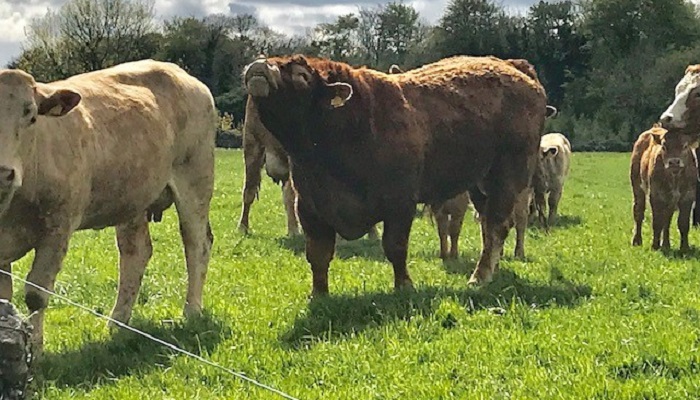15 February 2023
Beef farming and its challenges in Ireland

Beef farming is a very important agricultural activity in Ireland contributing to over 25% of total agricultural output. There are almost 140,000 farms in Ireland, of which almost 100,000 have some form of a beef enterprise.
The national breeding herd is made up of approximately 1.5 million dairy cows and 889,000 suckler beef cows, with a total herd of 6.6 million cattle. In comparison to other EU beef herds, Ireland has the third largest herd of suckler cows, after France and Spain.
Ireland is also in the top 10 list of beef exporters globally, producing 524,543 tonnes in 2020, of which 90% was exported mainly to the UK and European markets. Ireland’s unique climate offers the ability to grow large quantities of grass resulting in a competitive advantage both in terms of the cost of feed and the ability to market our product under quality Origin Green credentials. By utilising its certifiable environmental and animal health and welfare attributes, Irish beef is uniquely placed to command a premium position in the market place.
That being said, one of the main issues on Irish beef farms is profitability. In 2021, the average suckler income was €10,927, of which a large portion was derived from direct support payments. In addition, many producers are operating on a part time basis with an off-farm income used to support the family household. “The main challenge for the Irish beef sector is low farm incomes and maintaining economic sustainability” says IFA President Tim Cullinan.
On a per unit basis for carbon footprint, Irish beef is one of the lowest in the EU. However, improving environmental sustainability and reducing greenhouse gases (GHG) are also significant challenges for the sector. Irish farmers, advisors, researchers and associated professionals are therefore currently strongly focused on identifying and implementing best practice to further improve the environmental sustainability of Irish beef farms. Good animal health and welfare is also of critical importance, with many national agricultural schemes ensuring that Irish farmers are operating to a very high standard.
Although Irish beef farmers face multiple challenges, they are constantly in search of innovations that can improve the sustainability of their farms. The agricultural research, advisory and support organisations that exist in Ireland are central to the transfer of this knowledge.
Pearse Kelly, Head of Drystock Knowledge Transfer in Teagasc, identifies that “Constant improvements in production and technical efficiency along with the adoption of new technologies can make a real positive difference on beef farms, across all aspects of sustainability.”
Listening to the voices of farmers
Over the last three years, the Irish BovINE network identified the priority challenges facing beef farmers in Ireland through a number of national BovINE meetings. During these events, farmers were asked directly about the challenges they faced on a daily basis in becoming more sustainable on their enterprise.
Priority grass roots needs collected from farmers
Socio-economic resilience
- Initiatives to improve beef image and to break with the current trend of consumption decline;
- Methods to ensure a fairer distribution of the final price along the supply/food chain.
Animal health and welfare
- Simple labour-saving tools to measure and communicate high animal welfare standards on beef farms;
- On-farm health check of young stock prior to sale/purchase including vaccination status.
Production efficiency and meat quality
- Tools to evaluate the carcass and meat quality prior to and in the slaughter house;
- The use of alternative feedstuffs to reduce the high costs of raw material for feeding.
Environmental sustainability
- Environmental sustainability reward schemes for beef farmers;
- Tools for calculating and improving environmental sustainability on beef farms.
Strong farmer and advisor participation was ensured through the unique branch and county executive structure of the IFA and the extensive national Teagasc advisory network, with engagement of other actors, e.g., vets and agribusiness suppliers also encouraged.
Kevin Kinsella BovINE Network Manager said: “We asked farmers and they told us directly what their practical challenges are on a daily basis in making their farms more sustainable.” These responses were integrated with other farmers across Europe enabling the BovINE consortium to select the priority needs of European farmers across the four thematic areas of socioeconomic resilience, animal health and welfare, production efficiency and meat quality and environmental sustainability.
Over the three years, there was a large variety in the challenges and associated grass root needs identified by beef farmers. These ranged from methods to ensure a fairer distribution of price and price transparency, to simple tools to measure animal health and welfare and pre-health checks on animals prior to purchase, to payment methods for meat quality and ideas for alternative feedstuffs, to tools to measure environmental sustainability on farm and schemes to reward farmers for subsequent improvements.
These needs were presented to the BovINE project European partners to seek solutions that may exist from both research that has not yet been applied at farm level, and from good practices currently being implemented on beef farms across the EU. All solutions were then shared with Irish farmers through the free-to-all online platform the BovINE Knowledge Hub.
About BovINE
BovINE (Beef Innovation Network Europe) is an EU funded thematic network project focused on knowledge exchange to help address the challenges and drive the sustainability of the European beef farming sector and community. Connecting directly with farmers across Europe by providing an open online platform – the BovINE Knowledge Hub – the project brings together a consortium of 18 organisations from across nine European countries. This article was originally published in the BovINE magazine, click here for more information.
